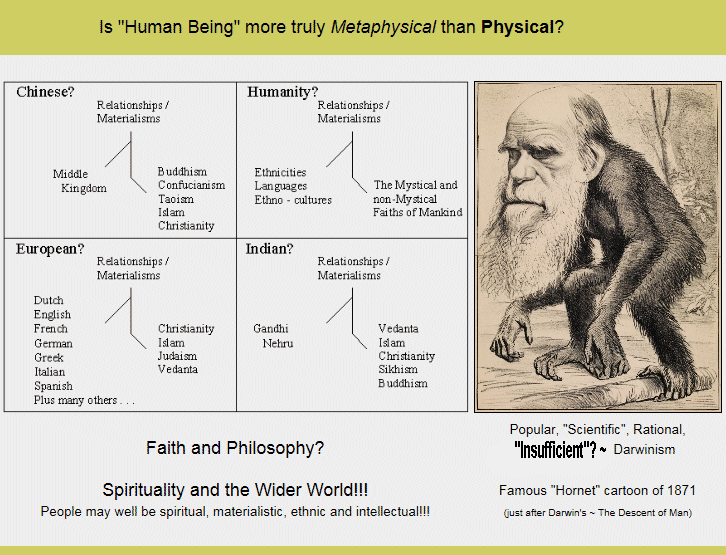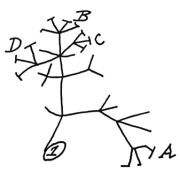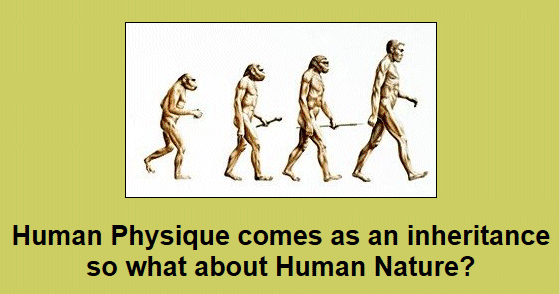Charles Darwin quotations and quotes
"It is interesting to contemplate a tangled bank, clothed with many plants of many kinds, with birds singing on the bushes, with various
insects flitting about, and with worms crawling through the damp earth, and to reflect that these elaborately constructed forms, so
different from each other, and dependent upon each other in so complex a manner, have all been produced by laws acting around us. These
laws, taken in the largest sense, being Growth with reproduction; Inheritance which is almost implied by reproduction; Variability from
the indirect and direct action of the conditions of life, and from use and disuse; a Ratio of Increase so high as to lead to a Struggle
for Life, and as a consequence to Natural Selection, entailing Divergence of Character and the Extinction of less improved forms. Thus,
from the war of nature, from famine and death, the most exalted object which we are capable of conceiving, namely, the production
of the higher animals, directly follows. There is grandeur in this view of life, with its several powers, having been originally
breathed by the Creator into a few forms or into one; and that, whilst this planet has gone circling on according to the fixed
law of gravity, from so simple a beginning endless forms most beautiful and most wonderful have been, and are being evolved."

To what extent does Darwinian Evolutionary Theory "EXPLAIN" Human Nature?
Darwin's theorising on evolution took place over more than twenty years!
Such content as the following selection, (dating from 1837 and the earlier days of his theoretical deliberations on "that mystery of mysteries the origin of species"), is to be found in Darwin's "Notebook B" and shows that he expected his theory to cover behavioral as well as physical evolution:-
"My theory would give zest to recent & Fossil Comparative Anatomy: it would lead to study of instincts, heredity, & mind heredity, whole metaphysics" ...
The Theory of Evolution, (as considered to be applicable to Humanity), has traditionally tended to focus on the physical!
Darwinian Science and Metaphysics

Whilst this present Age-of-the-Sage page content makes no attempt to address questions of whether the origins of Human Nature
are
~ "Natural? or Divine?" ~
our visitors can nevertheless find key insights on our site from such reliable authorities as:-
The Great Faiths - Plato & Socrates - Shakespeare
that give convincing support to such a "Tripartite" view of Human Nature!!!
~ "Natural? or Divine?" ~
our visitors can nevertheless find key insights on our site from such reliable authorities as:-
The Great Faiths - Plato & Socrates - Shakespeare
that give convincing support to such a "Tripartite" view of Human Nature!!!

It is widely known that Plato, pupil of and close friend to Socrates, accepted that Human Beings have a " Tripartite Soul " where the individual Human Psyche is noticeably composed of three aspects - Wisdom-Rationality, Spirited-Will and Appetite-Desire.
It is less widely appreciated is that Great World Faiths, and William Shakespeare, also effectively see "Spirituality" as being relative to "Desire" and to "Wrath".
Here at Age-of-the-Sage we have assembled effective endorsements - from Plato & Socrates, from all of five World Faiths and from Shakespeare - to the presence, in the Human Psyche, of a "Tripartism" of Wisdom-Rationality, Spirited-Will and Appetite-Desire:-

There are many entertaining and instructive quotations about, or attributable to, Charles Darwin:-
For instance, as a boy of sixteen his father said to him:-
"You care for nothing but shooting, dogs and rat-catching, and you will be a disgrace to yourself and all your family."

Darwin was keenly interested in Natural History as a young man and his Autobiography mentions one particular beetle hunt in detail:-
"I will give a proof of my zeal: one day on tearing off
some old bark, I saw two rare beetles and seized one in each
hand; then I saw a third and new kind, which I could not bear to
lose, so that I popped the one which I held in my right hand into
my mouth. Alas it ejected some intensely acrid fluid, which burnt
my tongue so that I was forced to spit the beetle out, which was
lost, as well as the third one".

In biological and evolutionary science a phylogenetic tree or evolutionary tree is a tree showing the evolutionary relationships among various biological species are believed to have a common ancestor.
 Perhaps the earliest example of a phylogenetic tree or evolutionary tree was actually devised by Charles Darwin. His
approach can perhaps be illustrated by this famous Tree of Life sketch from his Notebook B dating from 1837-8:
Perhaps the earliest example of a phylogenetic tree or evolutionary tree was actually devised by Charles Darwin. His
approach can perhaps be illustrated by this famous Tree of Life sketch from his Notebook B dating from 1837-8:
Charles Darwin's early evolutionary theory insight of how a branching tree-like genus of related species might originate by divergence from a starting point (1) to effectively establish related species at such notional points as A, B, C and D.
There is an accompanying text annotation that reads:-
I think
Case must be that one generation then should be as many living as now. To do this & to have many species in same genus (as is) requires extinction.
Thus between A & B immense gap of relation. C & B the finest gradation, B & D rather greater distinction. Thus genera would be formed. — bearing relation (page 36 ends - page 37 begins) to ancient types with several extinct forms.
From Darwin's Notebook B now stored in Cambridge University library.


Does Darwinian Evolution offer much in terms of explaining Human Nature?
Attempts to find answers to this question seems to raise deep, but interesting, issues associated with Human Existence.
